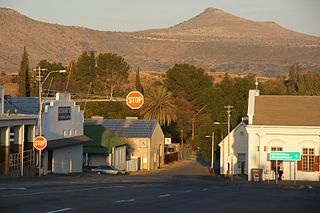 W
WAmandla!: A Revolution in Four-Part Harmony is a 2002 documentary film depicting the struggles of black South Africans against the injustices of Apartheid through the use of music. The film takes its name from the Zulu and Xhosa word amandla, which means power.
 W
WCradock is a town in the Eastern Cape Province of South Africa, in the upper valley of the Great Fish River, 250 kilometres (160 mi) by road northeast of Port Elizabeth. The town is the administrative seat of the Inxuba Yethemba Local Municipality in the Chris Hani District of the Eastern Cape.
 W
WThe Defiance Campaign against Unjust Laws was presented by the African National Congress (ANC) at a conference held in Bloemfontein, South Africa in December 1951. The Campaign had roots in events leading up the conference. The demonstrations, taking place in 1952 were the first "large-scale, multi-racial political mobilization against apartheid laws under a common leadership."
 W
WOn 18 July 1983, Mdantsane and East London communities embarked on a bus boycott to protest an unannounced five cent increase in bus fares. The residents abandoned the partly Ciskei government-owned Ciskei Transport Corporation (CTC) buses for taxis and trains. On 4 August 1983, the Ciskei police tried to prevent residents from taking the train at Egerton train station in Mdantsane. After hesitating, the crowd advanced a few paces. However, as the police drew their guns, the people stopped. Without warning, the police fired into the crowd killing 11 and injuring 36 commuters, leading to what is now known as the Egerton railway station bus boycott massacre, the Mdantsane bus boycott massacre, the Egerton massacre, and similar terms.
 W
WThe Freedom Charter was the statement of core principles of the South African Congress Alliance, which consisted of the African National Congress (ANC) and its allies: the South African Indian Congress, the South African Congress of Democrats and the Coloured People's Congress. It is characterised by its opening demand, "The People Shall Govern!"
 W
W"Gimme Hope Jo'anna" is a British anti-apartheid song written and originally released by Eddy Grant in 1988, during the apartheid era in South Africa. The song was banned by the South African government when it was released, but was widely played there nonetheless. It reached number seven on the UK Singles Chart, becoming Grant's first British top 10 hit for five years.
 W
WInternal resistance to apartheid in South Africa originated from several independent sectors of South African society and took forms ranging from social movements and passive resistance to guerrilla warfare. Mass action against the ruling National Party (NP) government, coupled with South Africa's growing international isolation and economic sanctions, were instrumental in leading to negotiations to end apartheid, which began formally in 1990 and ended with South Africa's first multiracial elections under a universal franchise in 1994.
 W
WLiliesleaf Farm is a location in northern Johannesburg, South Africa, which is most noted for its use as a safe house for African National Congress activists in the 1960s. In 1963, the South African police raided the farm, arresting more than a dozen ANC leaders and activists, who were then tried and prosecuted during the Rivonia Trial. Since the end of apartheid, the area has been turned into a museum and heritage site.
 W
WThe Mahlabatini Declaration of Faith was a statement of core principles laid down by South African political leaders Mangosuthu Buthelezi and Harry Schwarz on 4 January 1974. It was signed in Mahlabatini, KwaZulu-Natal, hence its name. Its purpose was to provide a blueprint for government of South Africa by consent and racial peace in a multi-racial society, stressing opportunity for all, consultation, the federal concept, and a Bill of Rights. It also first affirmed that political change must take place though non-violent means. It was the first agreement in apartheid South Africa by acknowledged black and white political leaders that subscribed to such principles. Final negotiations, which embodied many of the Declaration's principles, took place between President F.W. de Klerk and Nelson Mandela in the early 1990s.
 W
WEvelyn Ntoko Mase, later named Evelyn Rakeepile, was a South African nurse. She was the first wife of the anti-apartheid activist and the future president Nelson Mandela, to whom she was married from 1944 to 1958.
 W
WThe apartheid regime in South Africa began in 1948 and lasted until 1994. It involved a system of institutionalized racial segregation and white supremacy, and placed all political power in the hands of a white minority. Opposition to apartheid manifested in a variety of ways, including boycotts, non-violent protests, and armed resistance. Music played a large role in the movement against apartheid within South Africa, as well as in international opposition to apartheid. The impacts of songs opposing apartheid included raising awareness, generating support for the movement against apartheid, building unity within this movement, and "presenting an alternative vision of culture in a future democratic South Africa."
 W
WStephen Naidoo, C.Ss.R., was a South African Redemptorist and archbishop of the Roman Catholic Church. Archbishop of Cape Town from 1984 to 1989.
 W
WThe Rivonia Trial took place in South Africa between 9 October 1963 and 12 June 1964. The Rivonia Trial led to the imprisonment of Nelson Mandela and the others among the accused who were convicted of sabotage and sentenced to life at the Palace of Justice, Pretoria.
 W
WAngelique Rockas is an actress, producer and activist. Rockas founded Internationalist Theatre in the UK with patron Athol Fugard. The theater featured multi-racial casts in classical plays, breaking racial barriers that were once accepted norms for theatrical performances.
 W
WThe Sharpeville massacre occurred on 21 March 1960, at the police station in the South African township of Sharpeville in Transvaal.
 W
W"(Something Inside) So Strong" is a song written and recorded by British singer-songwriter Labi Siffre. Released as a single in 1987, it was one of the biggest successes of his career, peaking at number four on the UK Singles Chart.